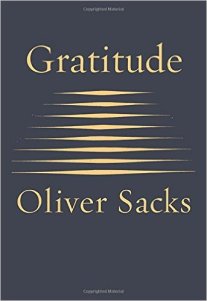Review of Oliver Sacks’ Gratitude

When I was a kid, my uncle Bob (Darlington School class of ’66) was my coolest relative. He drove an Alpha Romero convertible; he had long, wavy hair; he rode horses; and he did all these things while living in California (Fresno, actually, but I didn’t know any better; I assumed the entire state of California was sunshine and palm trees). Whenever Bob would catch a red-eye home for Christmas, we weren’t to disturb him until he awoke around midday (even his jetlag seemed cool.)
When I was in college, Bob gave me a copy of A Grateful Heart, a collection of ecumenical blessings from a broad array of faith traditions and secular sources (Bob had some West-Coast hippie in him, too). He knew knew that a disposition of thankfulness – of feeling grateful – would keep me grounded in my journey through life. Years on, I still have the book, which I thumb through regularly, mining its wisdom.
Gratitude is an idea I’ve been chewing on a lot these days – especially as I watch some of our students routinely miss opportunities to express thanks to our faculty for the letters of recommendation, the hours spent explaining (and re-explaining) the Krebs Cycle, the endorsements of their various candidacies, or to their parents for their extraordinary sacrifices to send them to our school. I don’t blame them for being blind to this, though; we do a poor job of teaching them how to communicate gratitude in authentic ways.
More troubling, it’s also at the center of what seems to be a rising tide of dissatisfaction among a subset of our parents who view independent schools on a strictly transactional basis. When “their” dreams of Harvard-Princeton-Yale-Stanford prove to be out of reach of their children, well…gratitude isn’t exactly the emotion they’re feeling.
Which is why Oliver Sacks’ monograph Gratitude caught my eye. Most people know Sacks, a British neurologist and author, from his portrayal by Robin Williams in the 1990 movie Awakenings, based on Sacks’ book of the same name. Sacks was a humanist, and not a person of faith, so I have always felt a certain philosophical connection to him (though to compare my lazy conclusions to his years of thoughtful writing would do him a profound disservice.)
Gratitude is a deeply affecting collection of four essays Sacks wrote for the New York Times during the two years before his death from cancer at age 81. The final essay, “Sabbath,” was published just two weeks before his death. This book will remind some of Randy Pausch’s The Last Lecture, a book that, I must confess, never quite sat right with me. To be sure, the tragedy of Pausch’s death hit me square in the heart, but the book also felt a little opportunistic for some reason. Sacks’ book feels less filtered; in fact, it reads like he is taking stock of his life as he is writing it. It is also not much of an autobiography; for that, see Sacks’ excellent On the Move: A Life.
In the first essay, “Mercury,” (a reference to Sacks’ lifelong fascination with the periodic table), Sacks paints himself as conflicted as most people would be, especially because at the time he wrote it, he was still in relatively good health, though he had recently been given a devastating diagnosis. He reflects on his unshakeable belief that his life is just beginning even as it has almost reached its end. He balances feelings of joy and regret with the knowledge that his mental life and perspective are expanding, and that he has been granted the freedom to “bind the thoughts and feelings of a lifetime together” (11). The tone of this first chapter is one of hopefulness, and its focus is on life – and what of it remains – not death.
Later essays concern the additional perspective Sacks gains as the end of his life looms. Sacks notes that he now sees his life “as from a great altitude, as a sort of landscape, and with a deepening sense of the connection of all its parts” (18). What emerges is a sense of mindfulness about his life and what it means to him, as well as an overwhelming sense of gratitude for those he loves and who love him and for what he has given and been given.
The centerpiece of my school’s mission statement is an aim to “provide each student an education that will enable him or her to live a moral, happy and productive life.” “HappyMoralProductive” (one word) has become an oft-repeated shorthand for that statement. Gratitude seems to me to be an essential element (or at least a natural byproduct) of living a good life and a notion we and our students would do well to appreciate more fully.
Sacks seems to agree; as he says at the book’s conclusion, “And now, weak, short of breath, my once-firm muscles melted away by cancer, I find my thoughts, increasingly, not on the supernatural or spiritual but on what is meant by living a good and worthwhile life – achieving a sense of peace within oneself” (45). Further, “I cannot pretend I am without fear. But my predominant feeling is one of gratitude…Above all, I have been a sentient being, a thinking animal, on this beautiful planet, and that in itself has been an enormous privilege and adventure” (20). That he can still feel grateful in the waning moments of his life serves as a reminder to me of the power gratitude has to shape one’s heart and mind.
Sacks’ little book truly has a lot to offer us.
A version of this review appears online here.